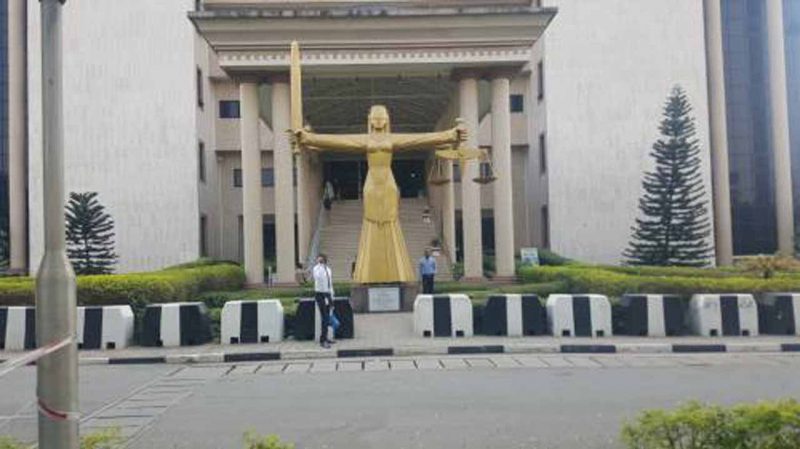

Federal High Court in Abuja
The 36 Governors lost on Monday in their opposition to Federal Government’s efforts to monitor their handling of Local governments’ funds.
Justice Inyang Ekwo of the Federal High Court in Abuja dismissed a suit filed to that effect by the 36 states, through their Attorneys General and the Nigeria Governors’ Forum (NGF).
The States, in the suit marked: FHC/ABJ/CS/563/2019, challenged the legality of the Nigerian Financial Intelligence Unit (NFIU) Guidelines, which came into effect on June 1, 2019.
The NFIU 2019 guidelines required among others, that the States/Local Governments Joint Accounts should be used only for receiving funds and subsequently transferring them to Local government accounts only.
The NFIU claimed that the guidelines, which also limit daily cash withdrawal from the State/LG joint account to N500,000 are intended to reduce “crime vulnerabilities created by cash withdrawal from local government funds throughout Nigeria effective from June 1, 2019.”
Listed as defendants in the suit are the Attorney General of the Federation (AGF), the NFIU and the Nigeria Union of Local Government Employees (NULGE).
They argued among others that the NFIU guidelines: known as “the NFIU Enforcement and Guidelines to Reduce Crime Vulnerabilities Crafted by Cash Withdrawal From Local Government Funds Throughout Nigeria,” particularly provisions 1 to 6 and the penalties prescribed are ultra vires the power of the NFIU under Sections 3 (1) and 23(2) (a) of the Nigerian Financial Intelligent Unit Act, 2018 and therefore unconstitutional.
READ ALSO:
In the judgement on Monday, Justice Ekwo held that he is unable to see where the guidelines contradict the provisions of sections 7(1), (6) (a) and (b) of the Constitution.
The judge added that the guidelines also did not conflict with the provision of Section 162(6) of the Constitution, which creates the State Joint Local Government Account, into which allocations to the Local Government Councils of the state from the Federation Account and from the government of the state are paid.
He said that the guidelines did not contradict Section 162(8) of the constitution which prescribed that the amount standing to the credit of the local government council of the state shall be distributed among the local government councils of that state on such terms and in such manner as may be prescribed by the House of Assembly of the state.
Justice Ekwo added that the provisions of the NFIU guidelines also do not contradict the provisions of the 4th Schedule to the 1999 Constitution which prescribes the functions of a Local Government Council.
Noting that “ duty of the court is limited to expounding the law and not expanding it,” the judge said: “On the whole, I see the provisions of the guidelines of the 2nd defendant as seeking to direct the monitoring of accounts, transfers and any other means of payment or transfer of funds of local government councils as provided for in Section 3 (1) (r) of the Act of the NFIU.
“It only limits cash withdrawal made from any Local Government Account anywhere in the country to amount not exceeding N500,000.00 (Five Hundred Thousand Naira) per day.
“Any amount higher than that can be done using other methods of banking transaction save cash.
“Unless it can be shown that there is any provision of the 1999 Constitution (as amended) which these provisions of the 2nd defendant’s guidelines have contradicted or conflicted directly and practically, then the issue of unconstitutionality cannot be said to arise.”
Justice Ekwo said he found that there was no provision in the NFIU’s guidelines that has contravened the provisions of Sections 7(1), (6) (a) and (b), 162 (6), (7) and (8), and the 4th Schedule to the 1999 Constitution (as amended).
“I also find that the case of the plaintiffs has not been established and I so hold.
“I find, in the end, that the case of the plaintiffs lacks merit and ought to be dismissed and it is hereby dismissed,” the judge said.
Earlier, Justice Ekwo struck out the name of the NGF as a co-plaintiff in the suit on the grounds that it lacked the locus standi to file the suit.
THE NATION
'Enough is enough', Tinubu directs security chiefs to stop violent attacks President Bola Tinubu…
Minister queries Julius Berger’s exclusion from furnishing of Abuja Conference Centre Minister of the…
FG says colleges of education will begin awarding degrees in September Minister of Education,…
Tuface named technical adviser to Benue governor Governor Hyacinth Alia of Benue State has appointed…
Delta Governor Oborevwori dumps PDP for APC Governor of Delta State, Sheriff Oborevwori, has announced…
Flying Eagles beat Egypt 2-1 in U-20 AFCON warm-up Nigeria’s U-20 national team, the…